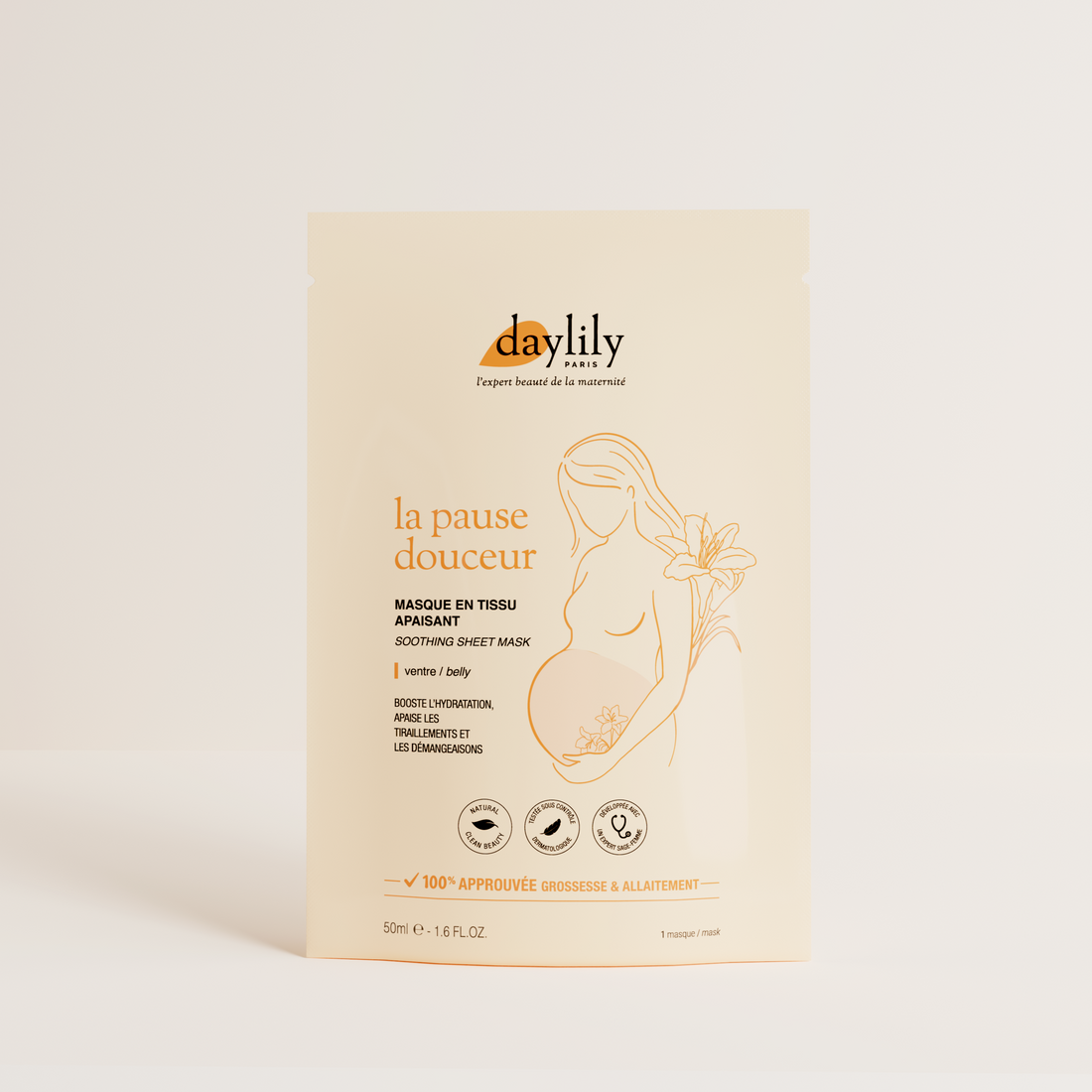- What is Proteinuria?
- What is high blood pressure (hypertension)?
- Monthly monitoring
- The complications...
- The protocol put in place in this case
Month by month as part of pregnancy monitoring, often during the monthly consultation appointment, you must undergo a urine analysis and blood pressure check . The terms associated with it are Proteinuria and Hyper Blood Pressure (HBP) , but what is hidden behind these terms?
Fabien Lequenne, Midwife, sheds light on this often obscure subject:
What is Proteinuria?
Also called albuminuria , proteinuria means an abnormal presence of albumins. Albumin is a protein present in large quantities in the blood but normally absent in urine. This is why, every month during pregnancy, you must urinate in a small pot to check your albumin level. Your urine will be checked using small strips to detect the presence or absence of albumins.
Daylily Paris is a brand of clean, sensory and effective skincare products, made in France and 100% compatible with pregnancy and breastfeeding. We're also committed to sharing quality information for informed and uninhibited motherhood. 🧡


What is high blood pressure?
Let's start by defining blood pressure or arterial pressure . This allows you to measure, in your body, the force of the blood on the artery walls . Thus, two numbers are measured in millimeters of mercury:
- The first, normally located around 12, corresponding to the systolic pressure
- The second, rather around 8, indicates the diastolic pressure
These two numbers are communicated in the form: “ 12/8 ”
Around 10% of pregnancies are complicated by hypertension. This is characterized by a tension greater than 1 4/9. There are 2 types of HTA:
- Pregnancy-related hypertension : it appears suddenly during pregnancy and affects approximately 8% of women.
- Essential arterial hypertension: this exists before pregnancy and affects approximately 2% of pregnant women.


- Regular price
-
29,90 € - Regular price
-
- Sale price
-
29,90 €
Monthly monitoring
This pregnancy-induced hypertension can therefore appear at any time during pregnancy even if your blood pressure was correct previously. It is therefore important and necessary to carry out regular monitoring of blood pressure during follow-up consultations.
This pathology is caused by pregnancy and will disappear on its own once the pregnancy is over.
Unlike essential hypertension, we suspect that the origin of pregnancy-induced hypertension lies in immunological mechanisms which come from an insufficiency of placental functioning. When the placenta functions less well, this can lead to what is called “chronic fetal distress” or “growth restriction” of the fetus. As nature is well designed, in order to avoid this type of situation, the human body of the pregnant woman will develop peripheral hypertension to compensate for this placental insufficiency. This allows the body to preserve sufficient central uterine blood flow for the growth and oxygenation of the baby. However, given that the placenta will age as the pregnancy progresses, this hypertension will often worsen and these compensation mechanisms, created by the woman's body to preserve the baby, may become insufficient. It is therefore essential to monitor the pregnancy from the beginning to the end to ensure that no underlying worsening occurs. Thus, additional examinations may be prescribed with reinforced medical monitoring, in particular to ensure the baby's proper development. (Kidney exams, protein dosage and blood pressure measurements more regularly, blood tests, monitoring, ultrasounds)
The complications...
The primary objective of this monthly monitoring of proteinuria and high blood pressure is to detect the signs of pre-eclampsia. This is a risky situation for the mother and her baby, which can lead to serious complications.
When blood pressure exceeds the threshold of 16/11, high blood pressure can progress and become complicated by severe hypertension.
This is where the importance of also monitoring proteinuria comes into play because the association between proteinuria and hypertension is very often a sign of complications such as pre-eclampsia.
Proteinuria sometimes announces kidney pain. Indeed, the role of the kidneys is to filter the blood by bringing into the urine everything that the human body does not need (excess water or mineral salts, or waste such as urea, acid uric acid, creatinine, ammonia, nitrite, etc.)
Proteins or albumins are supposed to remain in the blood and not end up in the urine, but in the case of hypertension, they can pass the kidney barrier and thus reveal poor kidney function which can lead to kidney disease.
In the event of significant kidney distress, the kidneys filtering less well and allowing proteins to pass into the urine, visible signs may appear such as significant edema (edema of the feet, hands or face) accompanied by significant weight gain and fast.
There are also other signs suggestive of hypertension: frequent and/or intense headaches, phosphenes which are visual disturbances (such as small stars in front of the eyes or hypersensitivity to light) or tinnitus (ringing in the ears ).
In the presence of these signs, it is imperative to check your blood pressure (at the pharmacy or at the doctor's office) and if the blood pressure is high, above 14/9, to consult the maternity ward urgently.
The complications of pregnancy-related hypertension can therefore be severe hypertension, pre-eclampsia, eclampsia (convulsions), HELLP syndrome (coagulation problem and liver problem), renal failure or HRP (Retro Placental Hematoma), leading to to acute fetal distress.


- Regular price
-
99,00 € - Regular price
-
167,80 € - Sale price
-
99,00 €
The protocol put in place in this case
Even if these complications are rare, a pregnancy with hypertension will therefore be a so-called “pathological” pregnancy. Thus the future mother will have greater monitoring with more frequent consultations (checking blood pressure, the presence of proteins in the urine, blood tests to assess the progress of pre-eclampsia).
The baby will also be closely monitored with monitoring and ultrasounds. In order to facilitate this close monitoring and ensure that the mother-to-be takes care of herself and rests, it very often happens that she is hospitalized.
Faced with these types of pregnancy complications, antihypertensive treatment is often carried out. Induction, or in the most serious cases, a cesarean section, can be performed to shorten pregnancies presenting too great a risk for the mother or the baby. After giving birth, the mother and her baby will have the right to increased postpartum monitoring.
Do you want to find out what awaits you each month of pregnancy? Whether for your body, for the baby or for the administrative and medical procedures to be carried out, find month-by-month pregnancy monitoring here .
Also discover our natural pregnancy treatments , specifically developed for future and young mothers. As well as our values and commitments .



















